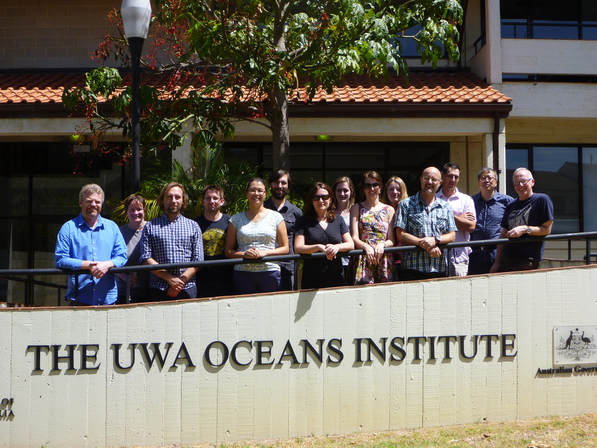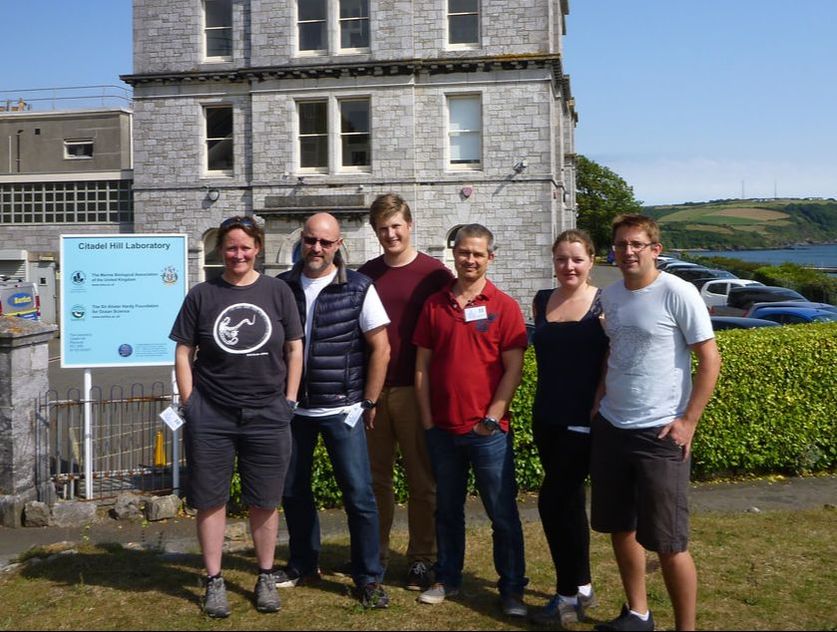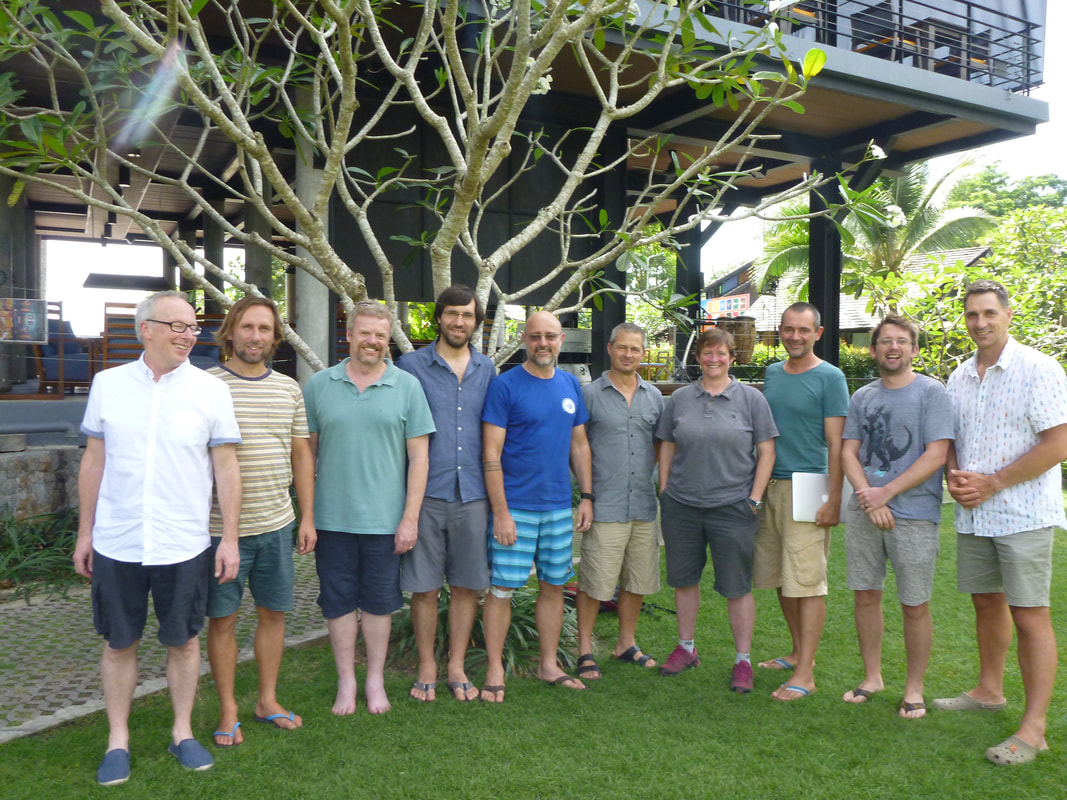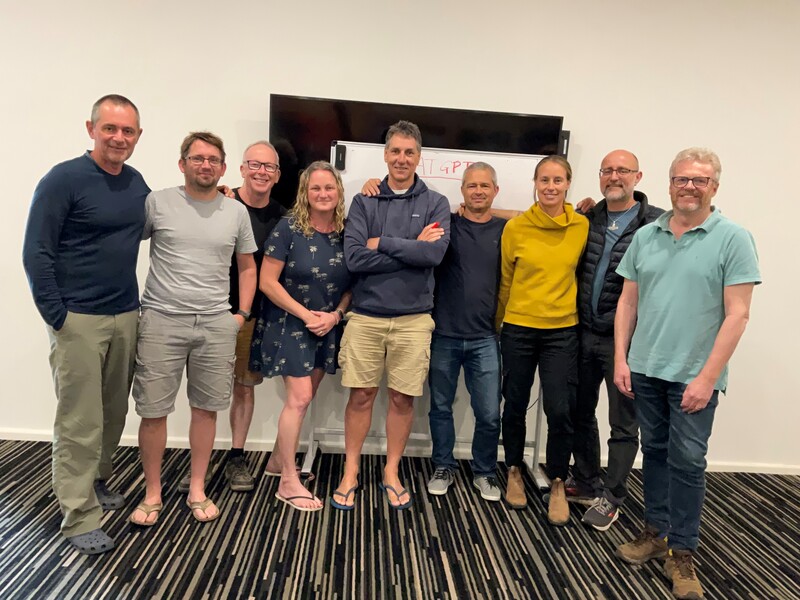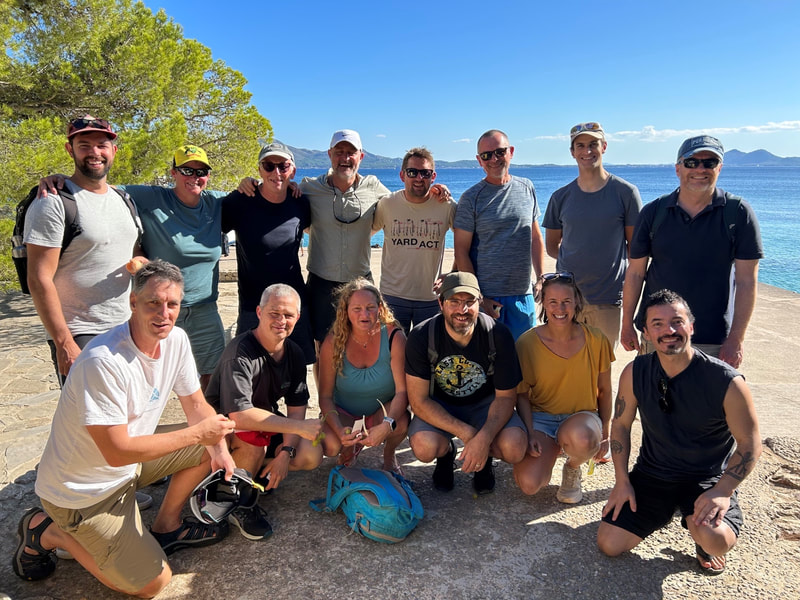The primary activities of the Working Group take place at workshops, with followup work back in our home institutes.
We welcome proposals for workshops and new contributors.
We welcome proposals for workshops and new contributors.
workshop #1Theme: Physical drivers and properties of marine heatwaves When & where: 19-21 January 2015, University of Western Australia Oceans Institute, Perth, Australia Who: Neil Holbrook, Pippa Moore, Markus Donat, Dan Smale, Jessica Benthuysen, Eric Oliver, Lisa Alexander, Hillary Scannell, Sarah Perkins, Sandra Straub, Thomas Wernberg, Alistair Hobday, Ming Feng, Michael Burrows, Alex Sen Gupta |
Workshop #2Theme: Ecosystem impacts of marine heatwaves When & where: 13-17 July 2015. The Marine Biological Association of the UK, Plymouth, UK Who: Pippa Moore, Thomas Wernberg, Ben Harvey, Mads Thomsen, Sandra Straub, Dan Smale |
workshop #3Theme: Global patterns and impacts of risk When & where: 21-23 February 2017 Ao Nang Beach, Krabi, Thailand Who: Mike Burrows, Markus Donat, Neil Holbrook, Eric Oliver, Thomas Wernberg, Mads Thomsen, Pippa Moore, Alex Sen Gupta, Dan Smale, Alistair Hobday |
Workshop #4
Theme: Rapid response options for marine heatwaves
When & where: January 13-16, 2023, Orford, Tasmania, Australia Who: Alex Sen Gupta, Dan Smale, Mike Burrows, Katie Smith, Alistair Hobday, Mads Thomsen, Karen Filbee-Dexter, Thomas Wernberg, Neil Holbrook |
workshop #5
Theme: Coastal datasets for marine heatwaves, biological impacts, early warning systems
When & Where: September 25-29, 2023. Mallorca Spain Who: Alex Sen Gupta, Dan Smale, Mike Burrows, Katie Smith, Alistair Hobday, Mads Thomsen, Karen Filbee-Dexter, Thomas Wernberg, Neil Holbrook, Pippa Moore, Neil Malan, Benjamin Richaud, Julio Salcedo-Castro |
Workshop #6
Theme:
When & Where: Who: |
|
Conferences with MHW sessions:
2024 AMOS 2024 (Australia) Beyond Temperature Extremes: Exploring the dynamics and impacts of marine heatwaves Miss Shujing Zhang, Prof. Alex Sen Gupta, Dr Neil Malan Session Description Marine heatwaves (MHWs) are discrete and prolonged extreme warming events that occur throughout the global ocean, with significant ecological and socio-economic impacts. With rising ocean temperatures due to climate change, MHWs are predicted to become more frequent, severe, and longer-lasting. Therefore, understanding and predicting these events have become urgent priorities to mitigate their far-reaching impacts. Significant advancements have been made in understanding the dynamics of MHWs, their changes over time and their ecological and human impacts. This session aims to unite studies on diverse aspects of MHWs, exploring their distribution, causes, evolution, and impacts. We welcome submissions on the following topics or innovative frontiers in MHW research. 1. Drivers and dynamics of MHWs 2. Observational and modeling approaches for MHW studies 3. MHW prediction across all timescales 4. Ecological and socioeconomic impacts and adaptation strategies to MHWs 5. Other ocean extremes (salinity, oxygen, acidification, productivity, etc) related to MHWs Ocean Sciences 2024 (New Orleans, USA) Alex Sen Gupta, Kathryn Smith, Cristian Martinez-Villalobos, Simona Masina Marine heatwaves (MHWs) - discrete temperature extremes in the ocean - can cause devastating impacts on marine organisms, ecosystems, and the human systems that depend on them. Individual MHWs have been associated with tens to hundreds of millions of dollars in losses for certain industries. Moreover, the interaction of extreme events with long-term anthropogenic warming has led to more frequent and severe damage over time. Significant advancements have been made in understanding the local and remote drivers of MHWs, their changes over time, and their biological and human impacts. Progress has also been made in forecasting MHWs across various timescales. Concurrently, new frontiers in MHW research are emerging, including:
2023 April, Bergen Norway - 5th Effects of climate change on the world's ocean. S5: Measuring and predicting responses of marine social-ecological systems to climate extremes. Encourage submissions related to climate extremes and associated compound events that: (1) improve understanding of the physical and biogeochemical processes of extreme events; (2) describe ecological and/or socio-economic consequences; (3) describe potential adaptation and management strategies that could mitigate these impacts, including those that advance forecasting of extreme and compound events. 2022 ICES - Dublin - September 2022 Theme Session E. Understanding and anticipating extreme events: their frequency. Our discussions will focus around extreme events, including stock collapses, regime shifts, marine heatwaves, cold snaps and storms. We will discuss the impacts these events can have on ecosystems, fisheries and livelihoods, and how these can recover afterwards. We'll also discuss advances in modelling that demonstrate that some of these events may be changing in frequency or severity as a result of climate change, but also that scientist's ability to predict or anticipate such events is starting to improve. International Conference on Southern Hemisphere Meteorology and Oceanography (ICHSMO 2022) Session: New frontiers in Marine Heatwave Research Conveners: Alex Sen Gupta, Neil Holbrook, Regina Rodrigues, Claire Spillman, Erik Behrens, Moninya Roughan, Mads Thomsen. AGU Ocean Sciences (Hawaii and hybrid) Session: OC09 Seasonal-to-decadal forecasting of the marine environment Convenors: Jonathan Tinker, [email protected] Alistair Hobday, [email protected] Stephanie Brodie, [email protected] Claire Spillman, [email protected] Leon Hermanson, [email protected] 2021 IMBeR West Pacific Symposium. Online. Nov 23-25, 2021 Session. Marine extreme events: Impacts, forecasting and risk management. Convenor: Alistair Hobday |
Special issues - 2022
Marine Heatwave Interactions. Frontiers in Climate. 14 papers published as part of this effort This Research Topic considers how marine heatwaves interact with other physical, chemical, biological or socio-ecological processes and events. Editors Sarah Elizabeth Perkins-Kirkpatrick, Svenja Ryan Vanessa Hernaman Jeremy Pittman, Thomas Wernberg, Alex Sen Gupta |
